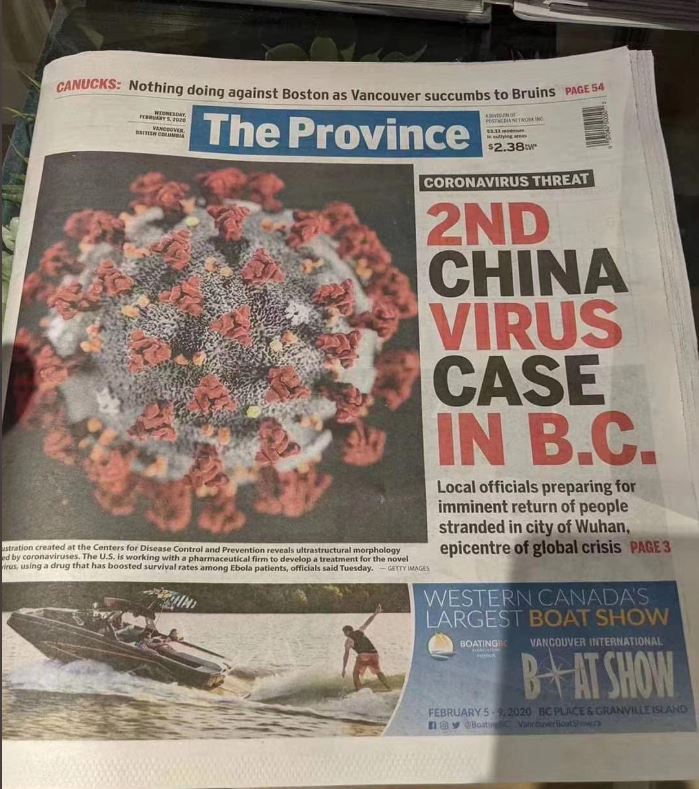'Racist', 'irresponsible': B.C. newspaper under fire for novel coronavirus-related headline
Posted Feb 6, 2020 6:20 am PST

The cover of the Province newspaper on Thursday referred to the novel coronavirus as the 'China virus.' The word choice has been met with criticism and demands for apology. (Courtesy Twitter/Andrew Wilkinson)
SUMMARY
The Province newspaper is taking major heat for a headline that is being called 'arrogant' and 'discriminatory'
VANCOUVER (NEWS 1130) – Racist backlash against Chinese people is a growing issue as the 2019 novel coronavirus continues to spread.
Now, The Province newspaper is taking major heat from the Chinese Consulate and others for a headline that is being called “arrogant” and “discriminatory.”
Wednesday’s front-page headline referred to the illness that’s killed more than 500 people and infected thousands as the “China virus,” something many people are taking issue with.
Linda Hao told NEWS 1130 she spotted the headline in a WeChat group, adding she was livid.
“We never called the H1N1 virus the ‘American virus,’ or we didn’t call Zika the ‘Brazilian virus,’ so why are we saying coronavirus is [the] ‘China virus?'” she said. “I was very upset about it.”
Hao said she emailed editors at the paper to express how she felt, but claims she didn’t get a constructive response back and feels the lack of apology so far adds insult to injury.
This is beyond disappointing to see this sort of thing happening in British Columbia. We don’t stereotype and fear monger in the face of a health scare. We need to work together to fight the virus, not each other. Together we are so much stronger.
331 people are talking about this
While the online version of the article written for the Province did not have the offensive name in the headline, the words “China virus” ended up on the print copy version of the publication. NEWS 1130 has also confirmed the reporters who wrote the article did not write the offensive headline.
Since the outbreak of the novel coronavirus, which is believed to have started in Wuhan, China, incidents reflecting anti-Chinese sentiment have been reported across the country.
“There is no way that we should be treating people like this,” Hao said. “What they’re doing right now suggest that it’s OK to call it a China virus… and they’re suggesting that it’s OK to [call] names.”
“In school we call it bullying but in society, what they are doing right now, they are bullying, isolating the Chinese community.”
In Vancouver, China’s Consul General, Madame Tong Xiaoling, said in a statement it was “obvious racial discrimination” on the front page, calling it “extremely unprofessional.”
“…Which not only counters the recommendations of the World Health Organization, but also reflects this paper’s arrogance, prejudice and discrimination,”Consul General Tong Xiaoling wrote.
“This is inconsistent with the Canadian core values as ‘The Province’ has always professed, as well as journalistic ethics. We demand that ‘The Province’ immediately apologize for its mistake and stop using similar language.”
WHO says names given by those who first report
In 2015, the World Health Organization released a paper outlining best practices for naming new diseases, “with the aim to minimize unnecessary negative impact of disease names on trade, travel, tourism or animal welfare, and avoid causing offence to any cultural, social, national, regional, professional or ethnic groups.”
The paper also said in an age of social media and rapid communications “it’s important that an appropriate name disease is assigned by those who first report a new human disease.”
So far there is no official name for the virus, which is also referred to as “coronavirus”, “new coronavirus”, and “novel coronavirus” but the best practices make it clear terms like “China virus” and “Wuhan virus” can do harm.
“WHO strongly encourage scientists, national authorities, the national and international media and other stakeholders to follow the best practices set out in this document when naming a human disease. If an inappropriate name is released or used or if a disease remains unnamed, WHO, the agency responsible for global public health events, may issue an interim name for the diseases and recommend its use, so that inappropriate names do not become established.”



No comments:
Post a Comment
Comments always welcome!